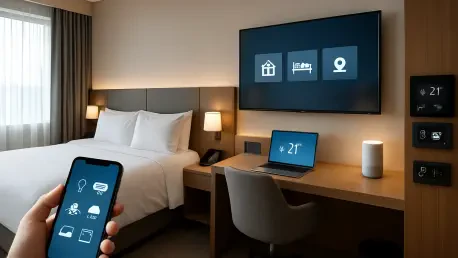In an era where technology permeates nearly every aspect of daily life, the hospitality industry finds itself navigating a complex landscape of innovation and tradition, striving to enhance guest experiences without sacrificing the warmth of human connection. A recent global survey of over 450 hotels, conducted between July and August of this year, sheds light on this delicate balancing act. The findings reveal an industry under pressure to adopt cutting-edge tools while grappling with guest challenges in using these systems and a persistent preference for personal interaction. From smart room features to AI-driven services, hotels are pushing boundaries to meet modern expectations. Yet, the question remains: can technology truly complement the essence of hospitality, or does it risk alienating those it aims to serve? This exploration into the evolving hotel landscape uncovers how properties worldwide are addressing these challenges, blending high-tech solutions with the timeless value of human touch.
Embracing ComfortTech for Enhanced Experiences
The drive to integrate technology into hotel rooms has led to the rise of what many in the industry call “ComfortTech”—innovations designed with practicality and user-friendliness in mind. Over half of the surveyed hotels, a notable 56%, feel compelled to continuously upgrade their tech offerings to stay competitive. These enhancements often include smart fans that adjust based on room temperature, customizable lighting systems for ambiance, and advanced bathroom features like digital water temperature controls and motion-sensor faucets. Smart TVs with seamless streaming capabilities also play a significant role in elevating guest convenience. Beyond these, some properties are experimenting with more futuristic solutions, such as voice-activated controls and biometric access systems. These technologies aim to create a seamless, personalized environment where guests can tailor their surroundings with minimal effort, reflecting a broader trend of using innovation to anticipate and meet individual needs without overwhelming the user.
While ComfortTech offers promising benefits, its implementation is not without hurdles. A significant number of guests struggle with even the most basic systems, such as adjusting lighting, connecting to Wi-Fi, or operating entertainment and air conditioning units. Recognizing this gap, 52% of hotels now offer verbal tech walkthroughs at check-in to guide guests through these features. This hands-on approach underscores a critical realization within the industry: technology must be accessible to be effective. Properties are learning that without proper support, even the most sophisticated tools can detract from the guest experience rather than enhance it. The focus is shifting toward ensuring that innovations are intuitive and accompanied by clear instructions or assistance, highlighting a commitment to bridging the digital divide for travelers of all tech-savviness levels. This balance between advancement and accessibility remains a key priority for many in the hospitality sector.
Prioritizing Human Connection Amid Automation
Despite the allure of automation, a striking 70% of hotels report that guests still crave human interaction, especially during check-in and when seeking personalized assistance. This preference has prompted some properties to scale back on overly automated features, such as robotic breakfast services, in favor of face-to-face engagement. While AI-powered concierge services and robotic room deliveries—seen in select hotels worldwide—offer efficiency, they often lack the empathy and nuanced understanding that human staff provide. Guests frequently express a desire for authentic conversations and tailored recommendations that only a person can deliver. This feedback has led many hotels to reevaluate their tech strategies, ensuring that automation serves as a supplement rather than a replacement for the personal touch that defines hospitality at its core. The industry appears to be leaning toward a hybrid model where technology handles routine tasks, freeing staff to focus on meaningful interactions.
Looking ahead, the interest in further technological exploration remains strong, with concepts like robotic staff and predictive personalization on the horizon. However, the survey findings emphasize that successful integration hinges on maintaining a human element. Hotels are increasingly aware that while tech can streamline operations and customize experiences, it often falls short without adequate familiarity and support. The challenge lies in ensuring that innovations do not create barriers but rather enhance the sense of care and connection that guests expect. Properties are experimenting with ways to blend cutting-edge tools with traditional service values, creating environments where guests feel both empowered by technology and comforted by personal attention. This ongoing effort to harmonize progress with emotional resonance reflects a broader understanding that hospitality is as much about relationships as it is about convenience or luxury.
Reflecting on a Path Forward
As the hospitality industry looked back on this pivotal year, it became clear that the journey of integrating technology had been both transformative and humbling. Hotels had ventured into uncharted territory with bold innovations, from smart room controls to AI assistants, yet they also encountered the limits of automation when faced with guests’ yearning for genuine connection. The lessons learned underscored a vital truth: technology served best when it supported, rather than overshadowed, the human essence of hospitality. Moving forward, the industry appeared poised to refine this balance by investing in user-friendly designs, robust guest support, and staff training to ensure tech complemented personal service. Exploring hybrid models that prioritized both efficiency and empathy emerged as the next step, promising a future where hotels could cater to modern demands while preserving the warmth that turned a stay into a memory. This nuanced approach offered a roadmap for sustained growth and guest satisfaction in the evolving landscape of travel.









